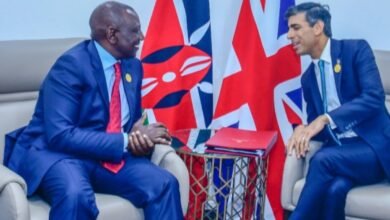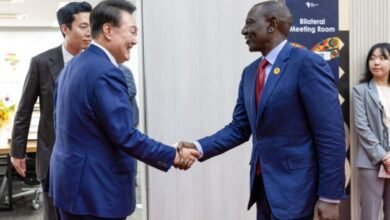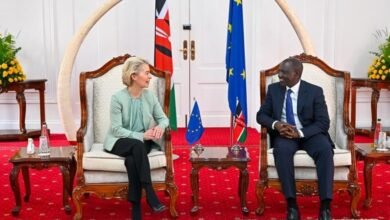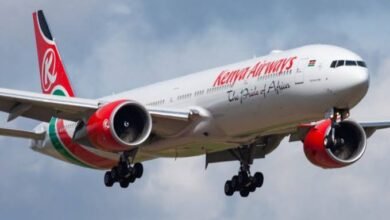
On Wednesday, Kenya inked bilateral deals on aviation cooperation, environmental conservation, trade and investment, on President Uhuru Kenyatta’s second day of his visit to Barbados, the Caribbean island.
Kenya is refreshing aviation partnerships that will see Nairobi reach out to the Caribbean market, with President Kenyatta calling for more trade, debt relief and vaccine equity for pandemic recovery.
President Kenyatta met the country’s Prime Minister Mia Amor Mottley and agreed on strengthening bilateral trade, much of which will see Kenya’s Kenya Airways find new routes to the Carribean Island.
The arrangements touched on a bilateral air services agreement, the first step for the two countries to allow airlines to enter cooperation and connections, and ease travel between the two regions.
Kenya’s Foreign Affairs Cabinet Secretary Raychelle Omamo signed the deal on behalf of Kenya while Barbados Minister for Tourism and International Transport Lisa Cummins represented her country at a ceremony witnessed in Bridgetown by both Heads of State.
The two countries have had no direct connection for flights and travellers heading, either way, have to mostly transit through the United States.
The signing of the deal may not cut the length of the trip, but it gives airlines like Kenya Airways easier access to the Caribbean through future code sharing.
The two sides also agreed to establish an entity called a Joint Committee on Trade and Investment, which will be the forum in which future trade agreements or negotiations can happen.
“I want to recognize extra-ordinary efforts of my brother President Uhuru Kenyatta for bringing a lot of policy issues together for Africa and the Caribbean. He has been at the forefront to bridge the gap in the Atlantic across many areas. There is still no direct link between Africa and the Caribbean and we hope to bridge that, said Barbados Prime Minster Amor Mottely.
Kenya and Barbados say they are working on their historical connections on a common African ancestry to improve business ties.
Barbados is an eastern Caribbean Island and an independent British Commonwealth nation. Bridgetown, the capital, is a cruise-ship port with colonial buildings and Nidhe Israel, a synagogue founded in 1654.
In 2020, global GDP per capita in Barbados amounted to about 10,925 U.S. dollars.
President Kenyatta said the African continent and the Caribbean Community and Common Market (CARICOM), the local bloc, can improve ties based on trade, tourism, sports and cultural fetes.
“This is one area where we are hoping to find great success that will make it easy for the businessmen and women, those seeking to re-engage with the African continent, to be able to do so without having to wait for visas from third parties,” President Kenyatta said.
“I think that all of us recognise now that we are in a marathon and not a sprint. And that we have had, in the past, to become resilient and this generation of Kenyans and Barbadians must be resilient to the times whether those times are affected by the pandemic or whether they are affected by the climate,” Mottley said, referring to the pandemic effects.
President Kenyatta has been on record calling on the global lenders to relieve the debt burden to poorer countries, including Kenya.
Also Read:
- Kenya, Barbados sign bilateral agreements on aviation, environment and trade
- UNCTAD15 can help jump-start world economy, says Uhuru
- Uhuru challenges global financial institutions to increase investment in agriculture
He has argued that the developing countries will bank on reduced debt burdens, more vaccines and easier channels of trade to recover.
“As tax revenues have dipped due to the contraction of economic activities, and the increase in the debt burden, the fiscal space to provide a safety net to vulnerable groups in many of our countries has, equally been significantly constrained,” the President said in a pre-recorded statement.
He spoke at the official opening of the opening plenary of the 15th session of the United Nations Conference on Trade and Development (UNCTAD), which opened on Monday in Georgetown, Barbados.
“The inequality in the sharing of vaccines reflects a multilateral system that is deeply flawed. To date, recovery has been unbalanced reflecting faulty lines that existed before the pandemic. There have been substantial differences in GDP growth between regions and countries, and a sharp divergence in income gains, amongst social groups,” the President said.
He urged countries to utilise the conference to agree on trade and development interventions that support diversification, improved financing and revitalization of multilateralism so as to achieve inclusive shared prosperity.
He rallied countries to leverage on established global frameworks such as the Addis Ababa Financing for Development Conference, the 2030 Sustainable Development Goals and the Paris Agreement on climate change as well as UNCTAD14’s outcomes to accelerate post-COVID-19 socioeconomic recovery.
“As I have demonstrated, UNCTAD has played an important role in supporting the implementation of UNCTAD14 commitments. The role will become even more critical in the next four years.
“Implementation of this agenda will take place in the context of major global challenges that have become even, more pronounced, since UNCTAD14,” President Kenyatta said.
He made a case for a functional multilateral system saying the challenges being experienced currently cannot be addressed by a single government or agency and pointed out that the unprecedented socioeconomic decline caused by Covid-19 had widened global inequalities and aggravated vulnerabilities of developing countries.
“It has reversed or stalled progress on implementation of the Sustainable Development Goals, rendering millions of people to lose their lives as well as livelihoods, and many have fallen back into extreme poverty.
“As tax revenues have dipped due to the contraction of economic activities, and the increase in the debt burden, the fiscal space to provide a safety net to vulnerable groups in many of our countries has, equally been significantly constrained,” the President said.
The International Monetary Fund, for example, created an emergency fund, known as the Special Drawing Rights, to help countries fight the pandemic crisis. But critics have argued the SDRs worth $650 billion, which are based on quotas of IMF members, have benefited developed countries more.
Last week, more than 250 civil society activists and organisations wrote an open letter to the IMF, asking that the allocation be increased to $3 trillion and that “economies are in less need of SDRs given their access to a wider array of monetary and financial tools for the response and recovery.”
They argued that it was “essential that the recent allocation be quickly followed by rechanneling a significant portion of advanced economies’ SDRs to developing countries,” an idea IMF Managing Director Kristalina Georgieva has agreed could help.
“Wealthy countries received more than $400 billion of the relief aid while developing countries received around $235 billion,” said Eric LeCompte, Executive Director of Jubilee USA, one of the NGOs that appended their signature on the open letter. “Wealthy countries can’t use the special currency and should donate it to poor countries being ravaged by the pandemic.” The NGOs argue developing countries can use emergency funds to support weak healthcare systems, social programmes and environmental conservation.





